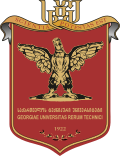Organization
Georgian Technical University has more than 22 000 students and around 2 500 faculty and staff members. Major faculties of the university are as follows:
Georgian Technical University has provided over 60% of Georgia's engineering, chemistry and scientific industry specialists for the last eighty years. While its major counterpart Tbilisi State University focuses on popular specialties like Civil Law or Economics, GTU continues its fine tradition of providing technical specialists to the industry and exact sciences. Additionally, over the recent years GTU added more establishments, "Caucasus Business School" — A joint project of GTU, Tbilisi State University and Georgia State University (Atlanta, Georgia, USA), German Studies faculty, a Franco-Georgian Studies Faculty and a "Cisco Networking Academy". GTU also has thirteen offspring institutes all over the country.
GTU uses the ECTS grading scale and awards degrees and diplomas in Diploma of Specialist, Bachelor of Science, Bachelor of Arts, and Master of Science. The first three degrees require four to four-and-one-half years of full-time studies; the Master of Sciences degree requires a year-and-one-half to two years of full-time studies. Most students (apart from those in humanities or arts specialties) undergo rigorous training in mathematics and fundamental sciences while studying at the GTU. GTU is known for its strong ties with "Andrea Razmadze Institute of Mathematics of Georgia", the leading mathematical research institute in Transcaucasia.
GTU also awards scientific Ph.D.s that require three or more years of advanced studies depending on specialty.
All degrees are also provided as part-time and distance studies; these may take much longer to complete.
GTU's scientific library is one of the largest libraries in Georgia, comprising 1,254,000 books of which many are unique and rare finds, and 500,000 periodic materials. Plans are underway for digitizing this large collection of knowledge.
This page is based on this
Wikipedia article Text is available under the
CC BY-SA 4.0 license; additional terms may apply.
Images, videos and audio are available under their respective licenses.

